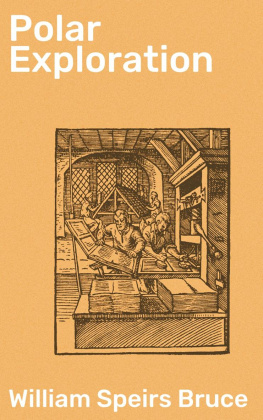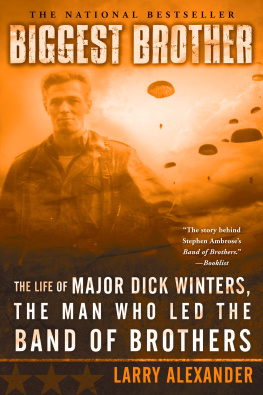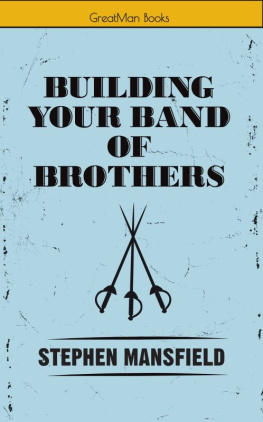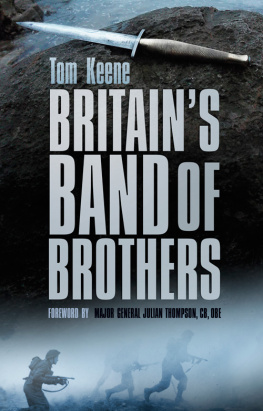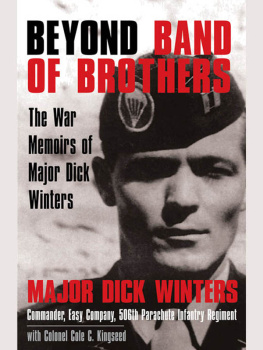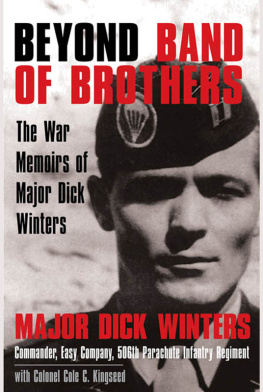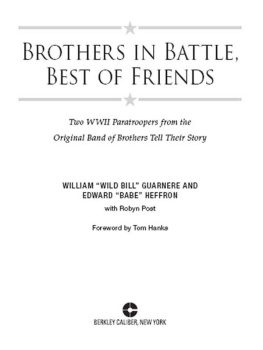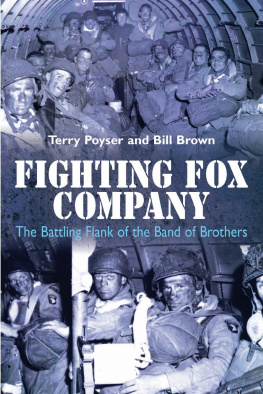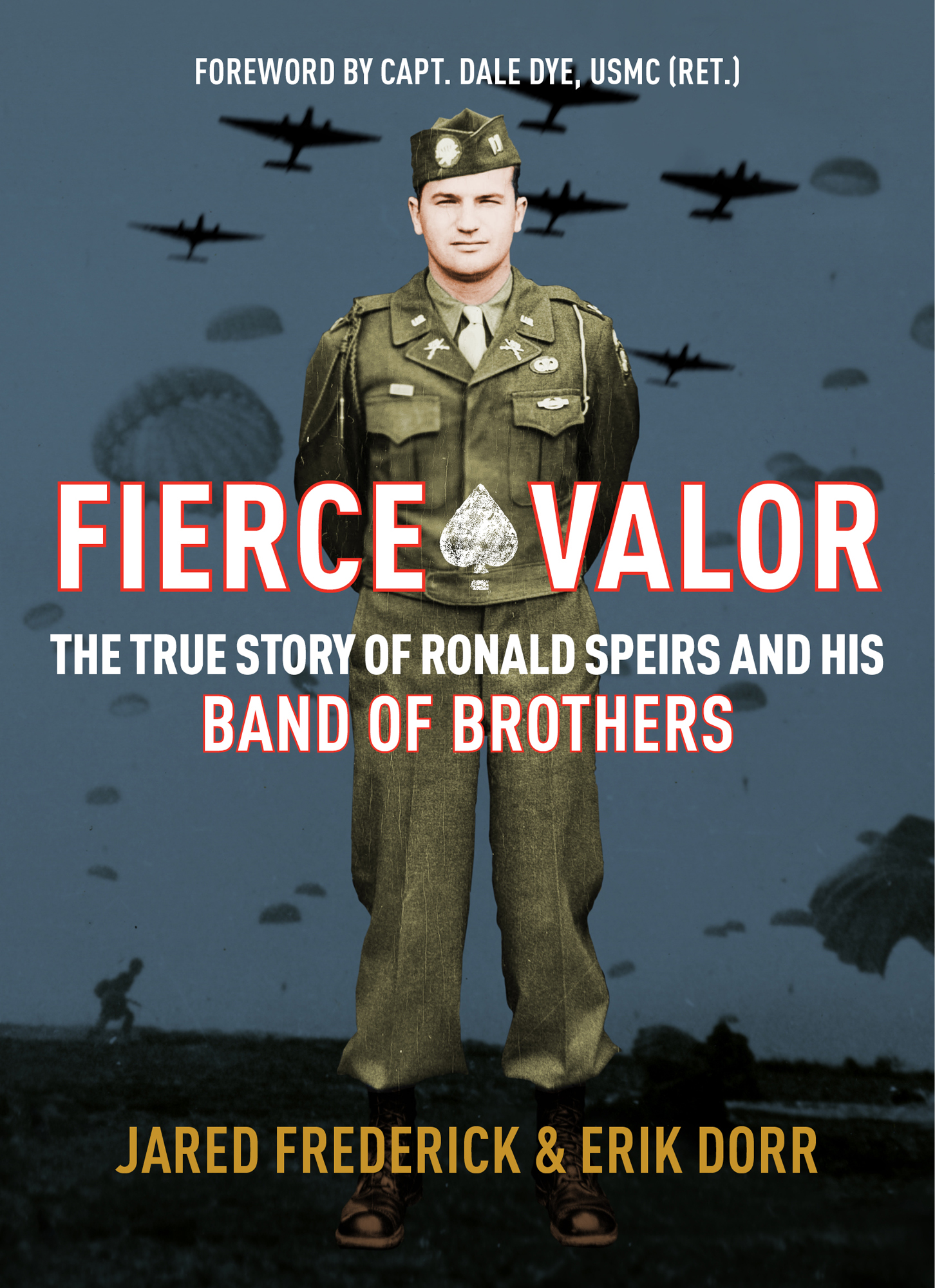Foreword by Capt. Dale Dye, USMC (Ret.)
Men of few words are the best men.
The essential American soul is hard, isolate, stoic, and a killer.
D. H. Lawrence

Map 1. Jared Frederick
FOREWORD By Captain Dale Dye, United States Marine Corps (Retired) Senior Military Advisor for the HBO Series Band of Brothers
O f all the World War II paratroopers I met and studied preparing for HBOs epic miniseries Band of Brothers, none was more mysteriousand thus intriguingthan Ronald C. Speirs. As a young platoon leader, Speirs made the D-Day jump with the celebrated 101st Airborne Division and was a featured player in the scripts adapted for television from historian Stephen Ambroses acclaimed book tracing Easy Company, 506th Parachute Infantry Regiment through the course of World War II in the European Theater of Operations (ETO).
Some of the other commissioned leadersmen such as Dick Winters, Buck Compton, and Harry Welshwere fairly easy to fathom: rock-solid leaders, brave soldiers, and relatively uncomplicated personalities. But Speirs was an enigma, a taciturn outsider from another company in the regiment, who eventually rose to command Easy Company. Speirs maintained a stiff-necked distance from his paratroopers, unlike other officers who generated both respect and intimate affection among the enlisted men. As an officer, amateur historian, and combat veteran, I wanted to know what made this guy tick. I wanted to be able to coach and counsel the talented actor, Matthew Settle, who was cast as Speirs in the production.
I began to dig, research, read, and talk to surviving Easy Company veterans. What I found in the literature were mostly lurid stories, garbled memories, and conflicting accounts. From veteran survivors, I obtained a broad spectrum of opinion. To some, then Second Lieutenant Ron Speirs was just a hard-ass, a cold, calculating leader who didnt place much value on human life, particularly his own. Others saw him as a savior who took over a battered company of paratroops suffering under hesitant and ineffective leadership at the assault on Foy, Belgium, during the Battle of the Bulge. Still others repeated versions of the claim that Speirs routinely and ruthlessly executed enemy prisoners. He was an officer who brooked no back-talk and expected instant obedience to orders in the confusion of close combat. So much so, in fact, that hes said once to have shot one of his own men who displayed either confusion or cowardice and therefore threatened to derail an attack. Like most anecdotal wartime tales, the story depends on the storyteller.
The common denominator in descriptions of Ron Speirs during the airborne campaigns of World War II in the ETO is that he was an unshakable leader and a crackerjack combat man. He led from the front in typical paratrooper fashion, often at significant peril to his own survival. Speirs, whatever his internal motivation, was a man whoif he didnt exactly relish close combatalways ran toward the sound of the guns. In the opinion of combat men, this is the highest quality a leader can possess, and the foundation of all others.
There is one often told taleperhaps a bit suspectin which Speirs informed a frightened paratrooper somewhere in France that fear vanishes if you simply consider yourself already dead. I never used that kind of line during my own experience as a combat leader, but I can think of several occasions when I wish I had. To me, its less the mark of a doomed fatalist and more the philosophy of a man who understands that death in combat is always just a heartbeat away. Worrying about being killed is a distraction from the mission at hand.
Some of the verified information about Ron Speirs didnt surprise me. He earned both a Silver Star and Bronze Star for heroic action and carried those decorations throughout a long career in the U.S. Army after World War II. He continued to distinguish himself as a paratrooper in Korea, making combat jumps with the 187th Regimental Combat Team. Speirs thereafter completed an enlightening tour as a liaison officer with Soviet Forces in 1956. Typical Speirs. A veteran combat man studying the most significant Cold War adversary facing the United States, contemplating a brutal war that everyone believed was just over the horizon. I was intrigued to learn that in 1957 he became military governor of Berlins infamous Spandau Prison, then housing Nazis convicted of war crimes at the Nuremberg Trials. Its intriguing to ponder a man who supposedly executed German prisoners in Normandy but subsequently guarded Nazi inmates convicted of much worse offenses. But whatever he may have thought of the task, the record indicates Speirs was a model prison warden at Spandau.
The official record also indicates that in 1961 Speirs was picked for a touchy, semi-secret assignment in Southeast Asia during Operation White Star in Laos, where he served as the senior liaison officer to the Royal Laotian Army. None of Speirss postWorld War II assignments or activities surprised me given what I knewor thought I knewabout the man, including that he married multiple times over his twenty-two year career as a soldier. But youll learn all about that in the pages that follow. Fierce Valor examines and dissects the man in detailed fashion and will allow you to form your own conclusions and opinions about Ronald C. Speirs.
Even with this account, he just might remain a fascinating but basically unfathomable character, as I concluded the one time I met him in 2001. We were on a dinner cruise on the Seine after screening an advance episode of Band of Brothers for Easy Company survivors gathered in Paris. While Stephen Ambrose made a speech, I sat down across from retired Lieutenant Colonel Ron Speirs and his wife. We spoke amiably about his career and mine. It was all just polite chit-chat until I broached a couple of questions about his service during D-Day in 1944. Speirs became a bit dissembling and vague in his responses.
I wasnt getting much more than nods and grunts until his wife reached across the table and put her hand on mine. Dont worry, she smiled with a shrug. Hes always like that. And I know you probably want to ask him about the shooting of prisoners. Dont bother, Mrs. Speirs said. He hasnt told me, and he wont tell you.
PROLOGUE
S wirls of black smoke billowed high above the steeples and splintered roofs. The stucco exteriors of storefronts and dwellings were pocked by the scars of urban battle. Carentan, the once ornate French commune nestled along the banks of the Douve River, was a charred and blistered shella ghostly visage of its former self. Local citizens had long awaited the hour of liberation from Nazi tyranny. Deliverance thundered forth from a devastating barrage of heavy naval guns, American artillery, and mortars raining ruin upon their historic community. Such was the terrible price of evicting the despised German occupiers. The place was a mess, observed one witness to the carnage. Buildings on fire, dead Germans lying around, smashed equipment, streets blocked by rubble or with gaping shell holes, and the not-too-distant crackle of small arms. The battle for Carentan was not yet done.


